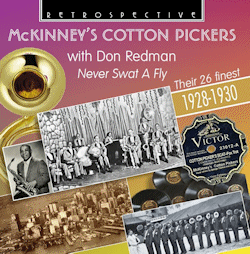Four or Five Times
Crying and Sighing
Milenberg Joys
Cherry
Nobody's Sweetheart
Sim-Me-Sha-Wabble
It's Tight Like That
Save It, Pretty Mama
I've Found a New Baby
Beedle-Um-Bum
Plain Dirt
I'd Love It
The Way I Feel Today
Miss Hannah
Peggy
Wherever There's a Will, Baby
If I Could Be with You One Hour Tonight
Zonky
Baby, Won't You Please Come Home?
Okay, Baby
Hullabaloo
Cotton Picker's Scat
Talk to Me
Rocky Road
Never Swat a Fly
You're Driving Me Crazy
McKinney’s Cotton Pickers
Recorded 1928-30 [79:32]
McKinney’s Cotton Pickers are certainly heard at their finest in these tracks spanning the creatively successful years of 1928-30. With Don Redman the
engine room as both multi-instrumentalist and musical director it was a territory band that transcended the description. Propelled by a steady rocking
two-beat brass bass rhythm its sprightly, punchy aesthetic offered the kind of consistency seldom heard even in the later Roaring 20s.
None of the soloists in the earliest incarnation here – the band actually went back to 1923 though under a very different name – was a star, but they were
able musicians and, marshalled by Redman, generated an unmistakable corporate sound. Perhaps their best-known recording, Four or Five Times, gets
things underway and it shows the template that was to be followed on numerous occasions – somewhat amusing, almost satiric vocals, punchy, crisp but brief
solos and a rich sax base over which the brass ride, propelled by that all-important rocking rhythm. Brass bassist Ralph Escudero is one of the forgotten
men but he provides the crucial role deep down.
The trumpeters John Nesbitt and Langston Curl had a penchant for King Oliver-inspired muted ‘talking’ and Redman’s inventive use of the clarinet choir is
reminiscent of Harlem bands of the day. That classic sound is heard at its apogee in the wonderful Nobody’s Sweetheart, rich, extrovert but
sufficiently loose-limbed not to be constrained by the beat. In 1929 the band was reshaped and the star soloists joined: the stellar trumpets of Joe Smith,
Leonard Davis and Sidney de Paris, trombonist Claude Jones, and the saxes of Benny Carter and Coleman Hawkins. Even Fats Waller graced the band temporarily
with his presence.
Smith takes a beautifully nuanced legato solo on If I Could Be With You on a 1930 side, by which time Hawkins had departed, to be replaced by an
original incumbent of the tenor chair, the under-rated Prince Robinson. Waller too, by this time, was gone but his replacement Todd Rhodes reprised Fat’s
earlier use of the celeste. When Rex Stewart joined the band his richly inventive and tonally piquant solos graced the weary parlando-vocals of Redman.
Trumpeter John Nesbitt is yet another under-sung member of this band, a man who shaped its direction and whose own compositions were peppy and attractive.
It’s a matter of great regret that he died at 35.
But these 26 tracks show how exciting and bright-toned this band was, and how it embodied the best of contemporary musical tastes to fashion something
inimitable in the music of the time.
Jonathan Woolf
